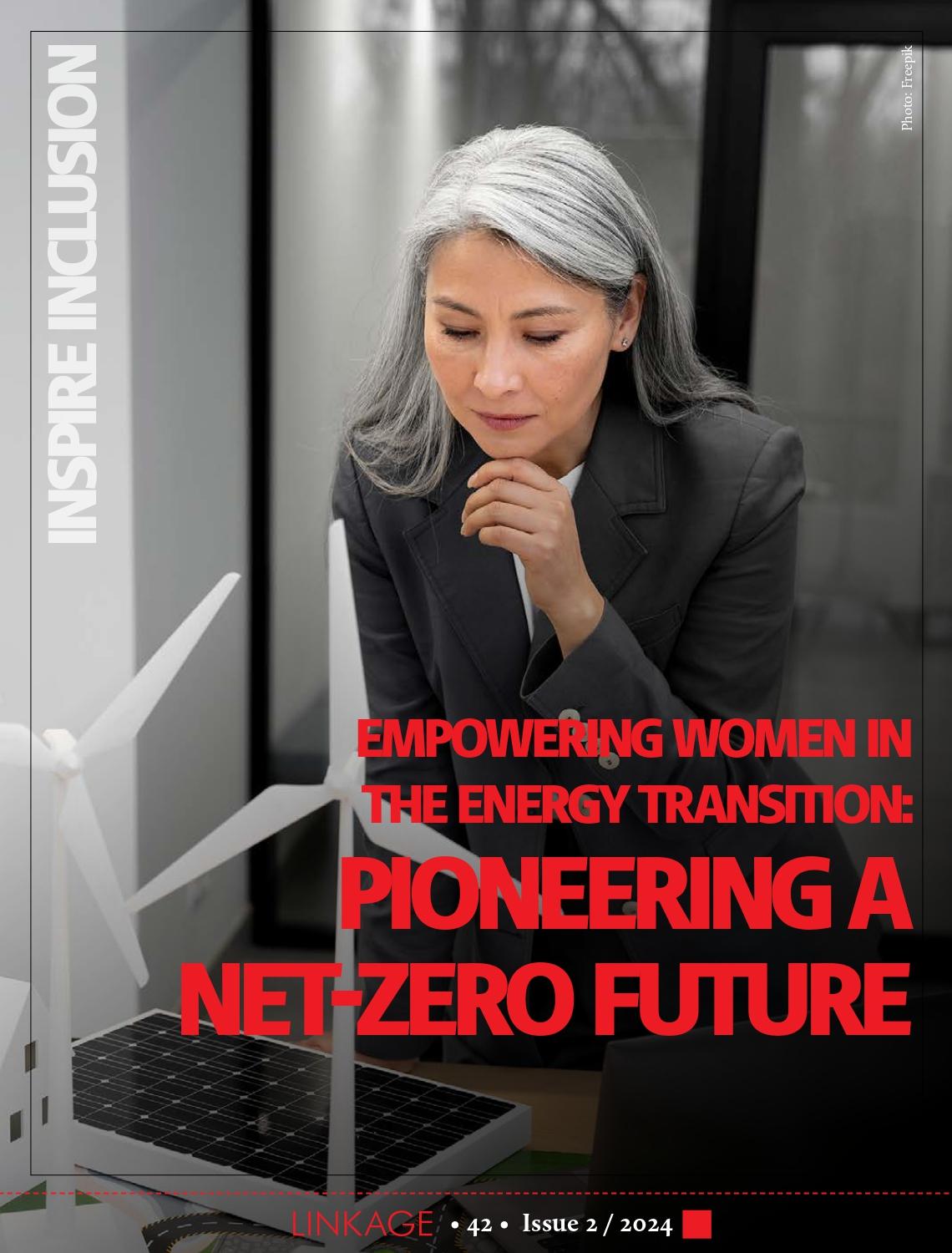Empowering Women In The Energy Transition:
Pioneering A Net-Zero Future
By Gillian Chevrotiere
Senior Manager, People Leadership and Culture | The National Gas Company Of Trinidad and Tobago Limited

LINKAGE Q2 (2024) - INSPIRE INCLUSION
A s the landscape of the energy sector undergoes a profound transformation, the role of women in that process of change is increasingly in the spotlight. It is imperative that as we push through the energy transition, we explore the challenges and opportunities for women in shaping the clean energy revolution and achieving net zero emissions.
Analysis of some of the transition data highlights notable inconsistencies in gender representation within the energy sector. According to the International Energy Agency’s (IEA’s) 2022 report, women comprise a mere 22% of the global energy workforce. The gender gap is more pronounced at the leadership level, with only 15% of senior and executive roles being held by women. In 2022 global climate negotiations and policy formation activities, such as those executed at COP28, women held only 27% of Heads of Delegation positions, and accounted for just 38% of delegates.
Similarly concerning are the United Nations reports around the representation of women on committees and decision-making bodies focused on net-zero emissions policies. For instance, in 2020, women constituted only 22% of members of the United Nations Framework Convention on Climate Change's (UNFCCC’s) Subsidiary Bodies, and merely 30% of members of the UNFCCC's Standing Committees.
These statistics emphasise the urgent necessity for coordinated Diversity, Equity, and Inclusion (DEI) initiatives, aimed at rectifying gender disparities and boosting female representation across all tiers of the energy sector.
On that point, statistics themselves must be an area that receives attention. While there are important studies and data that we can use as points of departure, there is still a relative shortage of gender-disaggregated data, which hampers efforts to accurately gauge and address gender disparities within the sector. According to Open Data Watch (2022), only 13% of countries globally allocate specific budget resources to invest in gender statistics, despite their crucial role in informing policy-making and government services.
What stands in the way?
· Despite the notable increase in academic achievements and career aspirations in recent years, women often fall victim to gender bias entrenched within the industry, including gender and cultural stereotypes, which often leads to unequal opportunities for career progression and leadership roles.
· The exclusion of women from community consultations, social dialogues, including discussions in boardrooms and policy-making intervention, sidelines their perspectives and insights, undermining the effectiveness and inclusivity of decision-making processes and innovative solutions.
Workplace discrimination continues to be a prevalent issue, with women encountering biased treatment and systemic barriers that hinder their professional growth and contribution to the energy transition. In a 2019 survey - Brazilian Women’s Network in Solar Energy - it was reported that 49% of women claimed to have suffered some kind of gender discrimination while 62% have heard sexist comments in a predominantly male work environment.
· In many countries, women face barriers such as limited access to training and mentorship programs specifically tailored to their needs, further impeding their professional growth.
Addressing these challenges requires a concerted effort from industry stakeholders to implement policies and practices that foster a culture of gender diversity, equity, and inclusivity, ensuring that women are empowered to play a significant role in shaping a sustainable “just transition.”
A “just transition” aims to green the economy fairly and inclusively, providing decent work opportunities for all. It maximises the social and economic benefits of climate action, mitigating the negative impacts of environmental degradation while effectively managing challenges through dialogue among impacted groups and upholding fundamental labour principles and rights.
What can be done?
· Supporting a “just transition” via DEI employee initiatives - both through creating new labour market opportunities and investing in workplace transformational programmes - has the potential to cultivate, by extension, inclusivity in the energy transition.
· Regulations, particularly directives pertaining to sustainability, can foster equitable participation from a diverse talent pool across all organisational levels. These regulations may also enforce pay transparency to help close pay gaps, or promote the establishment and implementation of quotas. For instance, the European Commission’s Directive on Gender-Balanced Boards mandates that listed companies ensure a minimum representation of women, with females constituting at least 40% of non-executive directors and 33% of all directors by June 2026.

Vital for gender DEI success: Encourage girls to pursue STEM careers.
· Inclusive policies, awareness campaigns, and influential knowledge sharing sessions in the workplace can ultimately play a pivotal role in advancing gender equality on the path towards a net-zero future. Global Women’s Network for the Energy Transition reported the world’s most diverse and inclusive companies such as Accenture invested US$927 million in continuous learning and development of their talent.
Inclusive policies that prioritise gender diversity can help secure equal representation and opportunities as the clean energy industry grows, but they must be informed by prior data collection and analysis. Awareness campaigns serve as powerful tools in challenging societal norms and biases. Their messaging can range from highlighting achievements of female leaders in sustainability, to debunking stereotypes about gender roles in the energy industry.
Designing recruitment practices that invest in talent prior to entry into organisations, or integrating steering committees that implement developmental programmes for existing female employees, are two tactics that can strengthen opportunities for women. Furthermore, given the continued male dominance of energy sector careers, the empowerment and mentorship of women within academic institutions, and encouragement of their pursuit of STEM careers, are necessary to drive change.
In constructing a low-carbon and sustainable economy, a just transition ensures that women are not marginalised, and can in fact contribute fully to the achievement of all goals. Evidence reinforces the fact that diversity is a key element of a productive and innovative workforce. It is therefore imperative that society recognise and act on the need to integrate more DEI initiatives, to ensure everyone can participate in and contribute to building a net-zero future.
ABOUT THE AUTHOR

Gillian Chevrotiere is the Senior Manager, People Leadership and Culture at The National Gas Company Of Trinidad and Tobago Limited